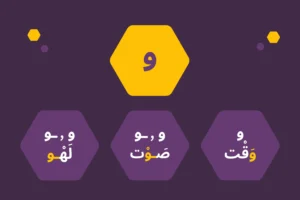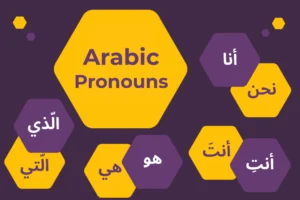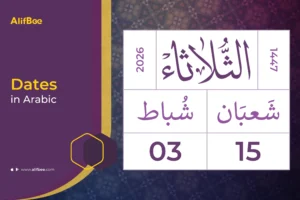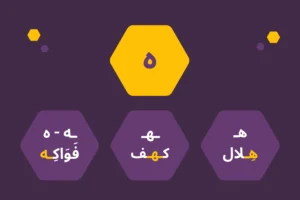100 Common Arabic Adjectives for Beginners
If you’re just starting to learn Arabic, adjectives are a great way to bring your sentences to life. Whether you’re describing a beautiful sunset, a tasty meal, or your best friend, these words help you express how things feel, look, or sound—making your conversations more real and relatable.
In this blog, you’ll find 100 common Arabic adjectives for beginners every learner should know. We’ve included the English meanings, simple transliterations, and example phrases so you can start using them right away.
So grab your notebook or open your language app—let’s make learning Arabic fun and practical.
Why Should I Learn Arabic Adjectives?
If you’ve started learning Arabic, you’ve probably picked up some common Arabic nouns and basic verbs. That’s a solid start, but what makes a language truly expressive are the words that describe. That’s where Arabic adjectives come in.
Adjectives in Arabic (called الصِّفات, as-ṣifāt) help you add color, detail, and emotion to your conversations. Instead of just saying “a house,” you can say “a beautiful house” (بَيتٌ جَميلٌ), or instead of “the man,” you can say “the tall man” (الرَّجُلُ الطَّويلُ). Suddenly, your speech becomes richer and more meaningful.
For beginners, learning Arabic adjectives early on builds confidence. It opens the door to describing people, places, and feelings.
It will help you when you’re ordering food, shopping, talking to a new friend, or reading a story, adjectives make your Arabic more relatable and human.
What Are Adjectives in Arabic?
In Arabic, adjectives الصِّفات (as-ṣifāt) are words that describe the qualities of people, objects, or ideas. Just like in English, they answer questions like What kind? Which one? or How many? For example:
English
Pronunciation
Arabic
A smart girl
(bintun dhakiyyah)
بِنتٌ ذَكيِّةٌ
An old book
(kitābun qadīm)
كِتابٌ قَدِيمٌ
But here’s the twist: Arabic adjectives follow strict rules of agreement. That means the adjective must match the noun it describes in gender (masculine or feminine) and number (singular, dual, or plural).
Quick Basics
- If the noun is masculine, the adjective must also be masculine.
English
Pronunciation
Arabic
A kind man
(rajulun ṭayyib)
رَجُلٌ طَيِّبٌ
- If the noun is feminine, the adjective becomes feminine, usually by adding a taa’ marbūṭa (ـة) at the end.
English
Pronunciation
Arabic
A kind woman
(imra’atun ṭayyibah)
اِمرأةٌ طَيِّبَةٌ
- If the noun is plural, the adjective changes accordingly—this rule takes a bit of practice, but it’s doable!
Understanding these patterns helps you build grammatically correct phrases and improves your fluency from the start. Once you get the hang of it, using Arabic adjectives becomes second nature.
How to Use Arabic Adjectives in a Sentence
Learning how to place adjectives in an Arabic sentence is one of the keys to speaking naturally and correctly. While English usually puts the adjective before the noun (a big house), Arabic does the opposite—the adjective comes after the noun.
Adjective-Noun Order in Arabic
In Arabic, you say:
English
Pronunciation
Arabic
a big house
(baytun kabīr)
بَيتٌ كَبيرٌ
a happy boy
(waladun saʿīd)
وَلَدٌ سَعِيدٌ
Think of it like saying “house big” or “boy happy”—it may feel unusual at first, but it becomes intuitive with practice.
Gender Agreement Examples
As we mentioned earlier, Arabic adjectives must match the gender of the noun they describe. Here’s how that looks in action:
English
Arabic Masculine
Arabic Feminine
A smart boy
(waladun dhakī)
وَلَدٌ ذَكِيٌّ
A smart girl
(bintun dhakiyyah)
بِنتٌ ذَكيِّةٌ
Notice how the feminine adjective ends in -ة (taa’ marbūṭa) to match the feminine noun.
Singular vs. Plural Usage
Arabic also requires adjectives to match the number of the noun—singular, dual, or plural.
English
Arabic
A small notebook
دَفتَرٌ صَغِيرٌ
(daftarun ṣaghīr)
masculine singular
Two small notebooks
دَفتَرانِ صَغِيرانِ
(daftaran ṣaghīrān)
dual form
Small notebooks
دَفَاتِرُ صَغِيرَةٌ
(dafatiru ṣaghīrah)
plural noun
Top 100 Common Adjectives in Arabic
So, here are 100 common Arabic adjectives in masculine and feminine forms:
English
Transcription
Arabic Word
big
kabīrun - kabīratun
كَبيرٌ - كَبيرةٌ
small
ṣaghīrun - ṣaghīratun
صَغيرٌ - صَغيرةٌ
happy
saʿīdun - saʿīdatun
سَعيدٌ - سَعيدةٌ
sad
ḥazīnun – ḥazīnatun
حَزينٌ - حَزينةٌ
tired
mutʿabun – mutʿabatun
مُتعَبٌ - مُتعَبةٌ
active
nashīṭun – nashīṭatun
نَشيطٌ - نَشيطةٌ
beautiful
jamīlun – jamīlatun
جَميلٌ - جَميلةٌ
ugly
qabīḥun – qabīḥatun
قَبيحٌ - قَبيحةٌ
tall/long
ṭawīlun – ṭawīlatun
طَويلٌ - طَويلةٌ
short
qaṣīrun – qaṣīratun
قَصيرٌ - قَصيرةٌ
new
jadīdun – jadīdatun
جَديدٌ - جَديدةٌ
old
qadīmun – qadīmatun
قَديمٌ - قَديمةٌ
strong
qawiyyun – qawiyyatun
قَويٌّ - قَويَّةٌ
weak
ḍaʿīfun – ḍaʿīfatun
ضَعيفٌ - ضَعيفةٌ
fast
sarīʿun – sarīʿatun
سَريعٌ - سَريعةٌ
slow
baṭīʾun – baṭīʾatun
بَطيءٌ - بَطيئَةٌ
smart
dhakiyyun – dhakiyyatun
ذَكيٌّ - ذَكيَّةٌ
stupid
ghabiyyun – ghabiyyatun
غَبيٌّ - غَبيَّةٌ
easy
sahlun – sahlatun
سَهلٌ - سَهلةٌ
difficult
ṣaʿbun – ṣaʿbatun
صَعبٌ - صَعبةٌ
rich
ghaniyyun – ghaniyyatun
غَنيٌّ - غَنيَّةٌ
poor
faqīrun – faqīratun
فَقيرٌ - فَقيرةٌ
clean
naẓīfun – naẓīfatun
نَظيفٌ - نَظيفةٌ
dirty
muttasikhun – muttasikhatun
مُتَّسِخٌ - مُتَّسِخَةٌ
sick
marīḍun – marīḍatun
مَريضٌ - مَريضةٌ
healthy
ṣiḥḥiyyun – ṣiḥḥiyyatun
صِحّيٌّ - صِحِّيَّةٌ
kind/nice
laṭīfun – laṭīfatun
لَطيفٌ - لَطيفةٌ
harsh
qāsin – qāsiyatun
قَاسٍ - قَاسيةٌ
fun
mumtiʿun – mumtiʿatun
مُمتِعٌ - مُمتِعَةٌ
boring
mumillun – mumillatun
مُمِلٌّ - مُمِلَّةٌ
hot
ḥārrun – ḥārratun
حَارٌّ - حَارَّةٌ
cold
bāridun – bāridatun
بَارِدٌ - بَارِدةٌ
heavy
thaqīlun – thaqīlatun
ثَقيلٌ - ثَقيلةٌ
light (weight)
khafīfun – khafīfatun
خَفيفٌ - خَفيفةٌ
bright
muḍīʾun – muḍīʾatun
مُضيءٌ - مُضيئَةٌ
dark
muẓlimun – muẓlimatun
مُظلِمٌ - مُظلِمَةٌ
expensive
ghālin – ghāliyatun
غَالٍ - غَاليَةٌ
cheap
rakhīṣun – rakhīṣatun
رَخيصٌ - رَخيصَةٌ
busy
mashghūlun – mashghūlatun
مَشغُولٌ - مَشغُولةٌ
empty
fārighun – fārighatun
فَارِغٌ - فَارِغةٌ
full
mumtaliʾun – mumtaliʾatun
مُمتَلِئٌ - مُمتَلِئَةٌ
near
qarībun – qarībatun
قَريبٌ - قَريبَةٌ
far
baʿīdun – baʿīdatun
بَعيدٌ - بَعيدةٌ
important
muhimmun – muhimmatun
مُهِمٌّ - مُهِمَّةٌ
famous
mashhūrun – mashhūratun
مَشهُورٌ - مَشهُورَةٌ
high
ʿālin – ʿāliyatun
عَالٍ - عَاليَةٌ
low
munkhafiḍun – munkhafiḍatun
مُنخَفِضٌ - مُنخَفِضةٌ
ambitious
ṭamwḥun - ṭamwḥatun
طَموحٌ - طَموحَةٌ
simple
basīṭun – basīṭatun
بَسيطٌ - بَسيطَةٌ
complicated
muʿaqqadun – muʿaqqadatun
مُعَقَّدٌ - مُعَقَّدَةٌ
open
maftūḥun – maftūḥatun
مَفتُوحٌ - مَفتُوحةٌ
closed
mughlaqun – mughlaqatun
مُغلَقٌ - مُغلَقَةٌ
necessary
ḍarūrīyun – ḍarūrīyyatun
ضَرُورِيٌّ - ضَرُورِيَّةٌ
ready
jāhizun – jāhizatun
جَاهِزٌ - جَاهِزةٌ
angry
ghāḍibun – ghāḍibatun
غَاضِبٌ - غَاضِبَةٌ
calm
hādiʾun – hādiʾatun
هَادِئٌ - هَادِئَةٌ
silent
ṣāmitun – ṣāmitatun
صَامِتٌ - صَامِتةٌ
cheerful
mariḥun – mariḥatun
مَرِحٌ - مَرِحَةٌ
selfish
ʾanāniyyun – ʾanāniyyatun
أَنَانيٌّ - أَنَانيَّةٌ
generous
karīmun – karīmatun
كَريمٌ - كَريمَةٌ
humid
raṭibun – raṭibatun
رَطِبٌ - رَطِبَةٌ
dry
jāffun – jāffatun
جَافٌّ - جَافَّةٌ
wide
wāsiʿun – wāsiʿatun
وَاسِعٌ - وَاسِعةٌ
narrow
ḍayyiqʿun – ḍayyiqatun
ضَيِّقٌ - ضَيِّقَةٌ
natural
ṭabīʿiyyun – ṭabīʿiyyatun
طَبيعيٌّ - طَبيعيَّةٌ
artificial
ṣināʿiyyun – ṣināʿiyyatun
صِنَاعيٌّ - صِنَاعيَّةٌ
common / shared
mushtarakun – mushtarakatun
مُشتَرَكٌ - مُشتَرَكةٌ
private
khāṣṣun – khāṣṣatun
خَاصٌّ - خَاصَّةٌ
formal
rasmiyyun – rasmiyyatun
رَسميٌّ - رَسميَّةٌ
random
ʿashwāʾiyyun – ʿashwāʾiyyatun
عَشوَائِيٌّ - عَشوَائِيَّةٌ
national
waṭaniyyun – waṭaniyyatun
وَطَنيٌّ - وَطَنيَّةٌ
International
duwaliyyun – duwaliyyatun
دُوَليٌّ - دُوَليَّةٌ
cultural
thaqāfiyyun – thaqāfiyyatun
ثَقَافيٌّ - ثَقَافيٌّةٌ
religious
dīniyyun – dīniyyatun
دينيٌّ - دينيَّةٌ
social
ijtimāʿiyyun – ijtimāʿiyyatun
اِجتِمَاعيٌّ - اِجتِمَاعيَّةٌ
Legal
qānūniyyun – qānūniyyatun
قَانُونيٌّ - قَانُونيَّةٌ
economic
iqtiṣādiyyun – iqtiṣādiyyatun
اِقْتِصَادِيٌّ - اِقتِصادِيَّةٌ
political
siyāsiyyun – siyāsiyyatun
سِيَاسيٌّ - سِيَاسيَّةٌ
amazing
mudhishun – mudhishatun
مُدهِشٌ - مُدهِشةٌ
wonderful/great
Rāʼiʻ un – Rāʼiʻatun
رائِعٌ - رائِعَةٌ
bad
sayyiʾun – sayyiʾatun
سَيِّئٌ - سَيِّئَةٌ
lucky
maḥẓūẓun – maḥẓūẓatun
مَحظُوظٌ - مَحظُوظَةٌ
brave
shujāʿun – shujāʿatun
شُجاعٌ - شُجاعَةٌ
afraid
khāʾifun – khāʾifatun
خائِفٌ - خائِفَةٌ
broken
maksūrun – maksūratun
مَكسورٌ - مَكسورَةٌ
spoiled /corrupted
fāsidun – fāsidatun
فاسِدٌ - فاسِدَةٌ
free (no cost)
majjāniyyun – majjāniyyatun
مَجَّانِيٌّ - مَجَّانِيَّةٌ
official
rasmiyyun – rasmiyyatun
رَسمِيٌّ - رَسمِيَّةٌ
confident
wāthiqun - wāthiqatun
واثِقٌ - واثِقَةٌ
curious
fuḍūliyyun – fuḍūliyyatun
فُضُوليٌّ - فُضُولِيَّةٌ
mysterious
ghāmiḍun – ghāmiḍatun
غامِضٌ - غامِضَةٌ
similar
mutashābihun – mutashābihatun
مُتَشابِهٌ - مُتَشابِهَةٌ
different
mukhtalifun – mukhtalifatun
مُختَلِفٌ - مُختَلِفةٌ
optimistic
mutafāʾilun – mutafāʾilatun
مُتَفائِلٌ - مُتَفائِلَةٌ
pessimistic
mutashāʾimun – mutashāʾimatun
مُتَشائِمٌ - مُتَشائِمَةٌ
comfortable
murīḥun – murīḥatun
مُرِيحٌ - مُرِيحَةٌ
annoying
muzʿijun – muzʿijatun
مُزعِجٌ - مُزعِجَةٌ
clear
wāḍiḥun – wāḍiḥatun
وَاضِحٌ - وَاضِحَةٌ
worried
mahmūmun – mahmūmatun
مَهمُومٌ - مَهمُومَةٌ
successful
nājiḥun – nājiḥatun
ناجِحٌ - ناجِحَةٌ
And there you have it! We have learned 100 Arabic adjectives for beginners that can take your basic vocabulary to the next level. The more you use these words in context, the faster they’ll stick.
Keep revisiting this list, try creating your own sentences, and don’t forget to combine these with common Arabic nouns and Arabic verbs you already know. Learning Arabic is a journey, and every new word you master brings you one step closer to fluency.
Want more practical tools to boost your Arabic? Try the AlifBee app and download our free 30-day Study Plan—packed with guided lessons and fun exercises designed just for beginners.
Happy learning!









